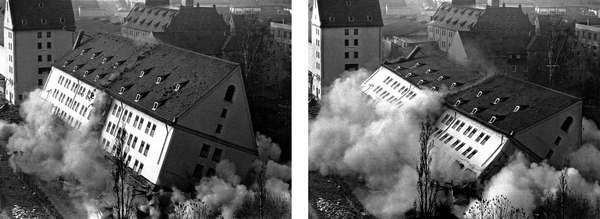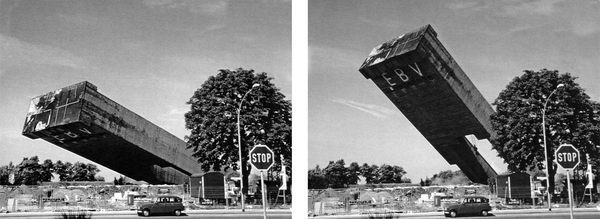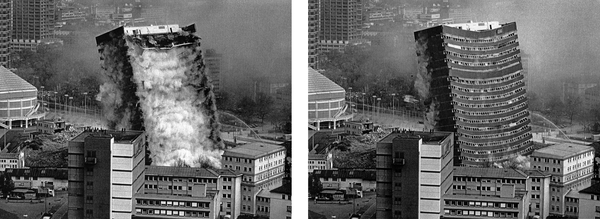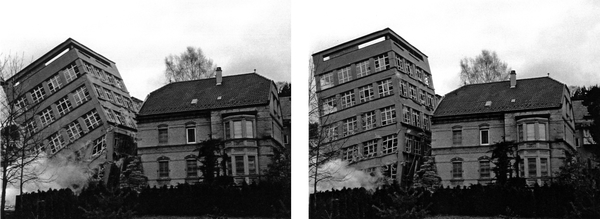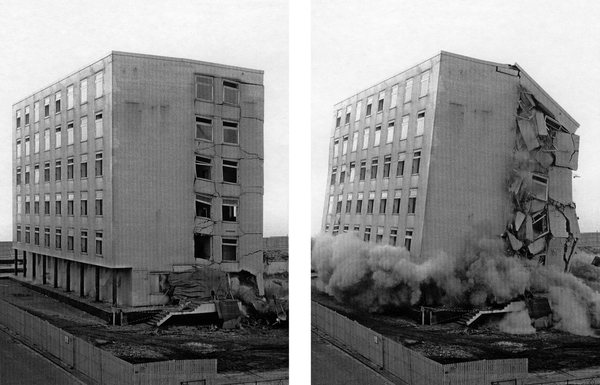Detonation … (Diptychs)
Julian Rosefeldt / Piero Steinle, Detonation Deutschland (Nr. 1–5, Diptychs), 1996/1999
Julian Rosefeldt / Piero Steinle
Detonation Deutschland (Nr. 1–5, Diptychs)
1996/1999
B/w photograph, Lambda print, variable dimensions (Diasec framing)
Edition 6 + 2 ap
In contrast to one of the most accentuated actions in post-war Germany – the reconstruction of destroyed cities – Julian Rosefeldt and his former collaborator Piero Steinle constructed the episodes of German post-war history with Detonation Deutschland (1996/1999) through a storyline of deconstructions.
They collected excerpts of original video and film footage showing demolitions from 1945 up until the mid-1990s, and collaged the extracts to typologies. Almost like a moving, cinematic antithesis to Bernd and Hilla Becher’s serial photographs of building typologies, the sequences are shown on seven screens in a darkened and longish room, doubled by a mirrored wall. Whilst ideologically fraught buildings such as bunkers, or the complex of the ‘Reichsparteitag’ in Nuremberg, are the first to be demolished, war-damaged buildings soon follow in order to delete the crucial traces of a tragic past. In the 1960s a second destructive wave rolls over Germany, when damaged and undamaged pre-World War II houses are destroyed to realise modern urban utopias. In the 1970s industrial buildings give way to the infrastructure of a changing economy. Finally, after the fall of the Berlin Wall in 1989, a frantic series of demolition starts again and post-war housing blocks (Plattenbauten) become the target of post-modern city planning.
The collage-like simultaneity of the projections contradicts the chronological historicity of the documents. The demolitions become metaphors of changing and vanishing systems, ideologies and societies. As ‘romantic mist’ and ‘orgies of dynamite power in frequently varying choreographies’
(R. Spieler) they allow the observer to slip into an ambivalent state, torn between fear and pleasure.
Summarised from Reinhard Spieler, in: News: Eine Videoinstallation von Julian Rosefeldt und Piero Steinle (1998);
and Matthias Winzen, in: Deep Storage – Arsenale der Erinnerung (1998)
Exhibitions
Detonation Deutschland (Nr. 1):
– The Ephemeral, Arndt Berlin, November 2011–February 2012 (curated by Tiffany Wood-Arndt, Matthias Arndt)
– Architektur in der Kunst – Architekturen des Augenblicks, Kunsthalle Bahnitz, May–August 2011 (curated by Bodo Rau)
Detonation Deutschland (Nr. 1–5):
– Julian Rosefeldt und Piero Steinle, Galerie im Park – Museum Franz Gertsch, Burgdorf, January–March 2003 (curated by Reinhard Spieler)
– News – Julian Rosefeldt / Piero Steinle, Galerie für Zeitgenössische Kunst, Leipzig, January–March 1999 (curated by Klaus Werner)
Detonation Deutschland (Nr. 2):
– Julian Rosefeldt – Meine Heimat ist ein düsteres, wolkenverhangenes Land, Arndt Berlin, July–August 2014
Detonation Deutschland (Nr. 3):
– Julian Rosefeldt – Meine Heimat ist ein düsteres, wolkenverhangenes Land, Arndt Berlin, July–August 2014
– The Ephemeral, Arndt Berlin, November 2011–February 2012 (curated by Tiffany Wood-Arndt, Matthias Arndt)
– Architektur in der Kunst – Architekturen des Augenblicks, Kunsthalle Bahnitz, May–August 2011 (curated by Bodo Rau)
– Julian Rosefeldt / Piero Steinle, Galerie Six Friedrich | Lisa Ungar, Munich, January–March 2000
Detonation Deutschland (Nr. 5):
– Julian Rosefeldt – Meine Heimat ist ein düsteres, wolkenverhangenes Land, Arndt Berlin, July–August 2014
– Architektur in der Kunst – Architekturen des Augenblicks, Kunsthalle Bahnitz, May–August 2011 (curated by Bodo Rau)

